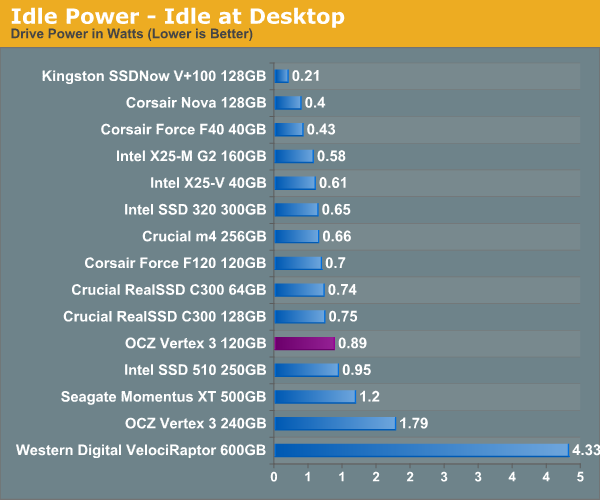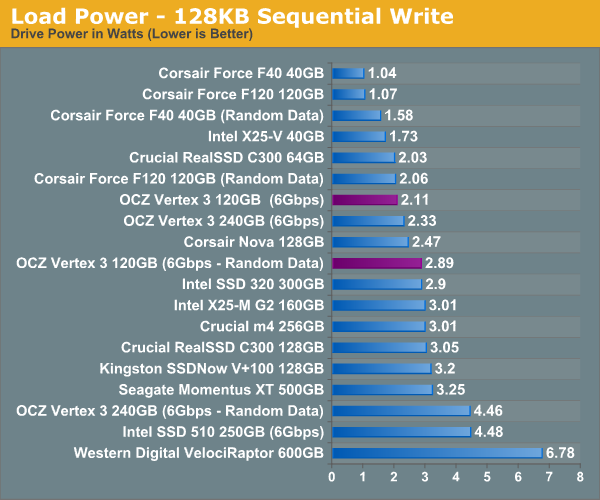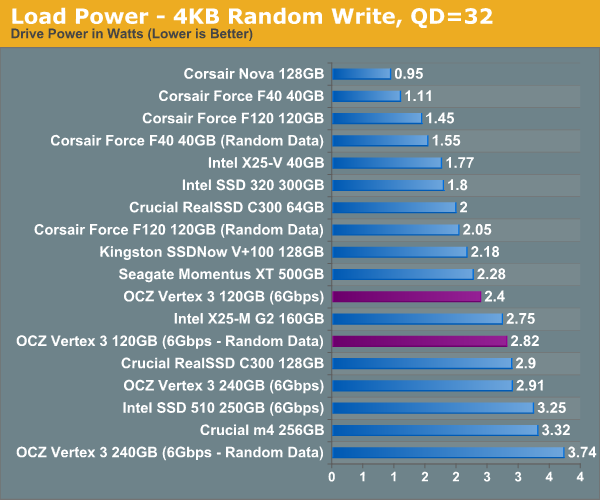The OCZ Vertex 3 Review (120GB)
by Anand Lal Shimpi on April 6, 2011 6:32 PM ESTTRIM Performance
In our Vertex 3 preview I mentioned a bug/performance condition/funnythingthathappens with SF-1200 based drives. If you write incompressible data to all LBAs on the drive (e.g. fill the drive up with H.264 videos) and fill the spare area with incompressible data (do it again without TRIMing the drive) you'll actually put your SF-1200 based SSD into a performance condition that it can't TRIM its way out of. Completely TRIM the drive and you'll notice that while compressible writes are nice and speedy, incompressible writes happen at a max of 70 - 80MB/s. In our Vertex 3 Pro preview I mentioned that it seemed as if SandForce had nearly fixed the issue. The worst I ever recorded performance on the 240GB drive after my aforementioned fill procedure was 198MB/s - a pretty healthy level.
The 120GB drive doesn't mask the drop nearly as well. The same process I described above drops performance to the 100 - 130MB/s range. This is better than what we saw with the Vertex 2, but still a valid concern if you plan on storing/manipulating a lot of highly compressed data (e.g. H.264 video) on your SSD.
The other major change since the preview? The 120GB drive can definitely get into a pretty fragmented state (again only if you pepper it with incompressible data). I filled the drive with incompressible data, ran a 4KB (100% LBA space, QD32) random write test with incompressible data for 20 minutes, and then ran AS-SSD (another incompressible data test) to see how low performance could get:
| OCZ Vertex 3 120GB - Resiliency - AS SSD Sequential Write Speed - 6Gbps | |||||
| Clean | After Torture | After TRIM | |||
| OCZ Vertex 3 120GB | 162.1 MB/s | 38.3 MB/s | 101.5 MB/s | ||
Note that the Vertex 3 does recover pretty well after you write to it sequentially. A second AS-SSD pass shot performance up to 132MB/s. As I mentioned above, after TRIMing the whole drive I saw performance in the 100 - 130MB/s range.
This is truly the worst case scenario for any SF based drive. Unless you deal in a lot of truly random data or plan on storing/manipulating a lot of highly compressed files (e.g. compressed JPEGs, H.264 videos, etc...), I wouldn't be too concerned about this worst-case scenario performance. What does bother me however is how much lower the 120GB drive's worst case is vs. the 240GB.
Power Consumption
Unusually high idle power consumption was a bug in the early Vertex 3 firmware - that seems to have been fixed with the latest firmware revision. Overall power consumption seems pretty good for the 120GB drive, it's in line with other current generation SSDs we've seen although we admittedly haven't tested many similar capacity drives this year yet.













153 Comments
View All Comments
jjj - Wednesday, April 6, 2011 - link
any chance of a comparison soon for the new gen SSDs running on p67 vs the non native sata 3 controllers out there(the marvell controller on many 1366 and 1155 boards or/and some cheap PCIe sata3 cards) and maybe an AMD system too?A5 - Wednesday, April 6, 2011 - link
I think they did a comparison in the P67 article. The P67 controller is the fastest, followed by AMD (it's within a few %), and then the 3rd part controllers are a good bit slower.Movieman420 - Wednesday, April 6, 2011 - link
What more can I say? I've been chomping at the bit over this issue ever since SR broke the story. As a loong time Ocz customer (ok...fanboy..lol) I couldn't believe Ocz was behaving like that. The max speed rating using the fastest test available is excusable...like you said, if Ozc would have went the altruistic route then the competition would have take full advantage in about 1 millisecond. After finding out about the inevitable switch to 25nm I quickly ordered another drive for my existing array from a lesser known vendor that I hoped was still selling older stock. I received the drive and to my dismay it was a 25nm/64Gb piece. Adding this drive to my existing array of 34nm/32Gb drives would have a definite negative effect. Which brings me to my point."After a dose of public retribution OCZ agreed to allow end users to swap 25nm Vertex 2s for 34nm drives, they would simply have to pay the difference in cost. OCZ realized that was yet another mistake and eventually allowed the swap for free."
This is only partially true. Replacements were offered based on drives that formatted below IDEMA capacity. If your drive formatted to the correct size, you were not eligible to swap. The only problem is that the 64Gb dies were also used in Vertex 2/Agility 2 drives that feature 28 percent over-provisioning (i.e. 50, 100, 200gb models). In this case the decreased capacity was 'hidden' for lack of a better term. This is where I locked horns with them. The exchange was only offered for the 60'E' and 120'E' drives even tho many others suffered the same performance issue for the same reason. I had to raise a bit of hell before they agreed to replace my 64nm/64Gb 'non-E' drive with a 34nm replacement. At first they would only swap for another 25nm drive and I stated that my issue was with performance NOT die size. They ended up replacing my drive with a 34nm model only because it would have put a hurting on my existing raid array of 34nm drives...they made it clear that this was an exception since I had a raid array that would be negatively affected. So anyone who bought a 28 percent OP drive with 64Gb nand chips was DENIED any sort of exchange unless a raid array was involved. As far as I know, that policy still stands unless Ryan or Alex decides to make good on the exchange for 28 percent OP, non 'E' 64Gb die drives which are internally identical to the 'E' drives just with a different amount of OP set by the firmware. While I may have been 'lucky' if you will because I had an array involved, there's people out there that purchased a high OP model which if anything should be a slightly better performer and instead it's the complete opposite. Charge a premium for the more expensive NAND? Absolutely! Just don't offer a half hearted exchange that doesn't cover all models affected...and not just for the ones whose OP doesn't hide the issue.
CloudFire - Wednesday, April 6, 2011 - link
thanks anand! really glad you put some pressure on Ocz. I hope other companies will follow suite as well. Here's to hoping you'd continue to do the right thing for us consumers in the future! :DDennis.Huang - Wednesday, April 6, 2011 - link
Thank you for the review and for your actions on behalf of customers. This was a great review for me as a new person to SSDs. Do you have any thoughts of the performance of the 480GB version of the Vertex 3 and/or do you plan to do a review on that version too?kensiko - Thursday, April 7, 2011 - link
I saw some number on the OCZ forum, I think it came from Ryder, for the 480GB and it performs even better than the 240.kensiko - Thursday, April 7, 2011 - link
Here:IO METER (QD=1) 2008 on P67 SATAIII
120GB 240GB 480GB
4KB Random READ 16.31 15.58 17.77
4KB Random WRITE 14.45 14.97 15.99
128KB Seq. READ 190.23 255.17 355.89
128KB Seq WRITE 345.21 342.99 313.98
bennymankin - Wednesday, April 6, 2011 - link
Please include Vertex 2 120GB, as it is probably one of the most popular drives out there.Thank you.
kensiko - Thursday, April 7, 2011 - link
The F120 does it, but true it's not the 25nmShark321 - Friday, April 8, 2011 - link
I concur. Vertex 2 120 GB should be compared to Vertex 3 120GB. I suspect the differences will be minimal on SATA II. It's basically the same product, with slight controller and firmware changes.